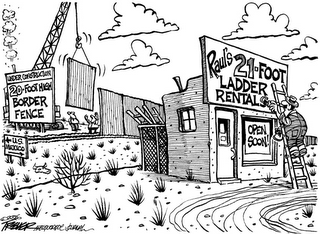I have never been a proponent of the idea that there is always a clearly defined and discernable cause and effect for any event, action, and so on. Too many variables, known and unknown, tend to cloud the calculus to trust the results absolutely. I believe in chaos, albeit a limited chaos – similarly, I believe in finite freedom of the will but that is an arcane theological issue concerning eschatology and faith – that clouds the judgment and disallows a purely empirical assessment of primal cause and ultimate effect.
Science is largely built on logical detached observation: its central article of faith is (relatively) objective observation. Heisenburg drilled holes in that supposition when he noted that the presence of an observer changes the experiment. What we know we have either reasoned out by having criticized the observation and established the relative predictability of a result to a given action. Ultimately, however, we don’t know. We trust in experience and in the maxims that describe the experience of others that have made similar observation. Our experience, while not absolute, allows existential certainty that a predictable result will follow a known cause. I let go of an object and it will fall toward earth: gravitation is observed and works. One might argue that the elemental forces of nature are immutable, perhaps even absolute. One might be correct in the assertion that an object dropped will always fall in the presence of gravity, or even that both objects will move toward each other in a manner that reflects the mass of either. But one cannot absolutely prove this, whether for fault of language or experience the possibility remains that it may not be so, however infinitesimal that possibility may be.
The human heart is a whole other thing. It has a logic all its own that defies simple cause/effect relationships. Why should this be? Are not our emotions the results of a physiological response to a stimulus? I hear a phrase or see an event. My brain processes that event and responds, based on its programming: the sum of my experience and the value system inculcated into that heart and mind. I hear that my wife wants a divorce and my heart breaks, as it has on two occasions. My daughter tells me she loves me and I feel a “warmth” that is simply ineffable. A car cuts across my path while cycling – as happened today – and I feel anxiety followed by relief. These are predictable. It is the events of the heart and mind that defy prediction which are difficult.
This brings me to my real concern today. I remain confused by the depth of emotion that I feel and the way that this seems only to intensify as I grow closer to 50 years of age. Jung once postulated that NTs (intuitive thinkers) become more feeling and sense oriented as they age, as if the psyche is seeking a balance. The same is true for other types, SJs (sensing judgers) become more imaginative and willing to let things be open, and so on. This is difficult for me as I am painfully aware that emotions pass, but the havoc that they can create remains long after the feelings have dissipated into the mist.
As an NT, I have always looked for order, even an order that is predicated upon chaos – I am intuitive, my mind can be wrapped around that idea – and I fear that this has been a quest that will never be completed. There is a part of me that has always felt that it is the journey, not the destination that causes the sailor to cast of the dock-lines. I have never felt that there is an ultimate meaning to life – Westminister Catechism be damned – and that we are not blessed with the vision to see beyond the context of our lives. Thus, all observations are by their nature narrow and parochial, subject to revision and in need of constant correction, or not ( I have to leave that possibility open, if I am to be an honest fool).
The problem with any strong emotion is that once it is past you are left with results that you could not have predicted because the chaos of the human heart and mind is greater than the ability to reason forces of nature.
Ah, but I am only a fool…


